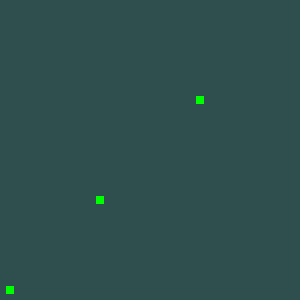Actor2D
Repository source: Actor2D
Description¶
Example to demonstrate an actor that draws 2D data.
The object vtkActor2D is similar to vtkActor, but it is made to be used with two dimensional images and annotation.
vtkActor2D object has a position but does not use a transformation matrix like vtkActor and it has a reference to a vtkMapper2D object which does the rendering.
Question
If you have a question about this example, please use the VTK Discourse Forum
Code¶
Actor2D.java
import vtk.vtkNamedColors;
import vtk.vtkNativeLibrary;
import vtk.vtkRenderWindow;
import vtk.vtkRenderWindowInteractor;
import vtk.vtkRenderer;
import vtk.vtkPoints;
import vtk.vtkVertexGlyphFilter;
import vtk.vtkPolyData;
import vtk.vtkPolyDataMapper2D;
import vtk.vtkActor2D;
public class Actor2D
{
// -----------------------------------------------------------------
// Load VTK library and print which library was not properly loaded
static
{
if (!vtkNativeLibrary.LoadAllNativeLibraries())
{
for (vtkNativeLibrary lib : vtkNativeLibrary.values())
{
if (!lib.IsLoaded())
{
System.out.println(lib.GetLibraryName() + " not loaded");
}
}
}
vtkNativeLibrary.DisableOutputWindow(null);
}
// -----------------------------------------------------------------
public static void main(String s[])
{
vtkNamedColors colors = new vtkNamedColors();
//For Actor Color
double actorColor[] = new double[4];
//Renderer Background Color
double Bgcolor[] = new double[4];
colors.GetColor("Lime", actorColor);
colors.GetColor("DarkSlateGray", Bgcolor);
vtkPoints Points = new vtkPoints();
Points.InsertNextPoint(10, 10, 0);
Points.InsertNextPoint(100, 100, 0);
Points.InsertNextPoint(200, 200, 0);
vtkPolyData PolyData = new vtkPolyData();
PolyData.SetPoints(Points);
vtkVertexGlyphFilter GlyphFilter = new vtkVertexGlyphFilter();
GlyphFilter.SetInputData(PolyData);
GlyphFilter.Update();
vtkPolyDataMapper2D Mapper = new vtkPolyDataMapper2D();
Mapper.SetInputConnection(GlyphFilter.GetOutputPort());
Mapper.Update();
vtkActor2D Actor = new vtkActor2D();
Actor.SetMapper(Mapper);
Actor.GetProperty().SetColor(actorColor);
Actor.GetProperty().SetPointSize(8);
// Create the renderer, render window and Interactor.
vtkRenderer ren = new vtkRenderer();
vtkRenderWindow renWin = new vtkRenderWindow();
renWin.AddRenderer(ren);
vtkRenderWindowInteractor iren = new vtkRenderWindowInteractor();
iren.SetRenderWindow(renWin);
// Add the actor to the scene
ren.AddActor(Actor);
ren.SetBackground(Bgcolor);
renWin.SetSize(300, 300);
renWin.Render();
iren.Initialize();
iren.Start();
}
}
